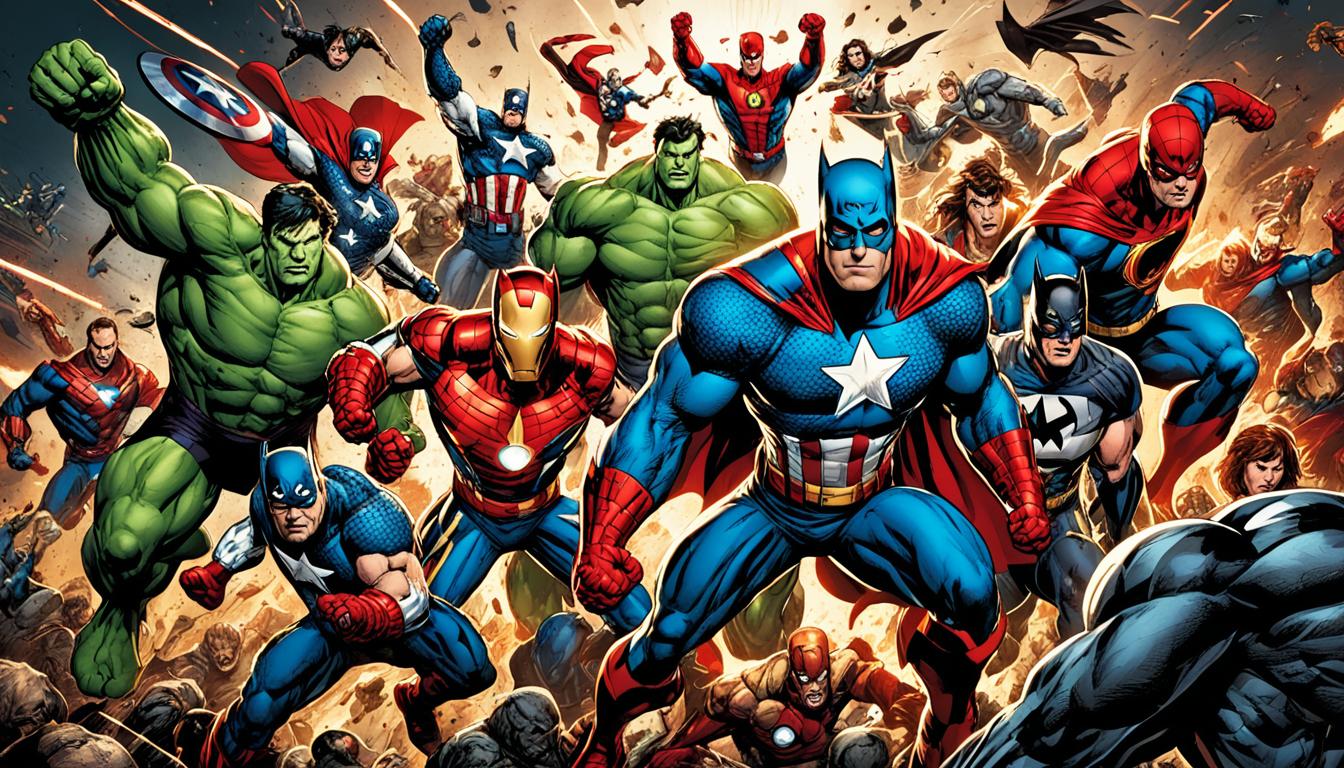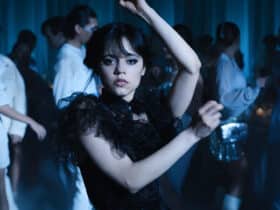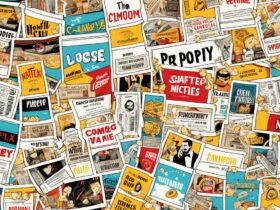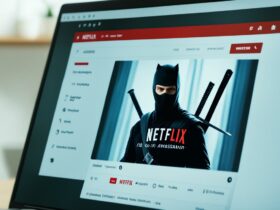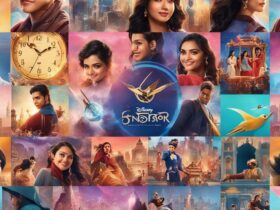When it comes to the world of comic books, there has always been a fierce competition between Marvel and DC. These two iconic publishers have brought us legendary characters, captivating storylines, and thrilling adventures. However, in recent years, Marvel has emerged as the undisputed champion in the battle for superhero supremacy. So, what sets Marvel apart and makes it better than DC?
Marvel Comics, the home of heroes like Spider-Man, Iron Man, and the Avengers, has built a universe that resonates deeply with fans. Their rich history of storytelling and compelling character development has captivated readers for decades. Marvel’s vibrant and interconnected universe is a testament to their creativity and vision, drawing readers into a web of adventure that is hard to resist.
On the other hand, DC Comics boasts iconic characters like Superman, Batman, and Wonder Woman, who have become household names. DC has a storied history and has pioneered the superhero genre with the creation of the Justice League. Their characters embody ideals of justice and heroism, inspiring generations of fans.
But what truly sets Marvel apart is the success of its cinematic universe. The Marvel Cinematic Universe (MCU) has revolutionized the superhero genre, bringing beloved characters to life on the big screen with films like Iron Man, The Avengers, and Black Panther. The MCU’s cinematic achievements, coupled with its intricate storytelling and character-driven narratives, have catapulted Marvel to unprecedented heights.
Key Takeaways:
- Marvel has emerged as the dominant force in the comic book and superhero industry.
- The rich history and storytelling styles of Marvel and DC contribute to their unique appeal.
- Marvel’s flawed and relatable superheroes and the interconnectedness of their universe set them apart.
- Both Marvel and DC have introduced iconic characters that resonate with audiences worldwide.
- The success of the Marvel Cinematic Universe has cemented Marvel’s position as the reigning champion.
The Rich History of DC Comics
DC Comics, originally known as National Allied Publications, has a rich history that dates back to the 1930s. During the Golden Age of comic books, DC Comics introduced iconic characters that would go on to become the cornerstones of the superhero genre.
One of the most notable superheroes created by DC Comics is Superman. Debuting in 1938, Superman became an instant hit, captivating readers with his superhuman powers and commitment to justice. The success of Superman paved the way for other iconic characters like Batman, Wonder Woman, The Flash, Green Lantern, and Aquaman.
DC Comics played a pivotal role in establishing the superhero genre and defining its tropes. The concept of superheroes with secret identities, colorful costumes, and a dual life between heroics and civilian duties was popularized by DC’s characters.
The Golden Age of Comic Books
DC Comics emerged during what is known as the Golden Age of comic books, a period that spanned from the late 1930s to the early 1950s. This era saw a surge in the popularity of comic books and the introduction of many enduring superheroes.
DC Comics’ superheroes became cultural icons, offering an escape from the harsh realities of the time. The stories they told served as beacons of hope and inspiration, resonating with readers and capturing their imaginations.
The Justice League: United for Justice
DC Comics further solidified its place in comic book history with the creation of the Justice League. First appearing in The Brave and the Bold #28 in 1960, the Justice League brought together DC’s most iconic heroes, including Superman, Batman, Wonder Woman, The Flash, Green Lantern, and Aquaman, among others.
The Justice League represented the ideals of justice, heroism, and the battle between good and evil. This iconic superhero team set the stage for the concept of a shared universe, where characters from different comics could team up and face larger threats together.
The rich history of DC Comics has left a lasting legacy in the world of superheroes and comic books. From the Golden Age of comic books to the creation of the Justice League, DC has shaped the superhero genre and captivated audiences for decades.
Marvel Comics: The House of Ideas
Marvel Comics made its mark on the comic book industry during the 1960s, known as the Silver Age of comic books. This era witnessed the introduction of flawed and relatable superheroes who resonated with readers, such as Spider-Man, the X-Men, and the Avengers. Marvel embraced a unique approach to storytelling, focusing on the humanity of its characters and exploring themes of identity, responsibility, and the consequences of power.
The House of Ideas, as Marvel is often called, revolutionized the comic book landscape by pioneering the concept of interconnectedness within its universe. Characters frequently crossed over into each other’s stories, forming alliances and friendships that mirrored the complexities of the real world. This interconnectedness created a rich tapestry of stories and evolved into what is now known as the Marvel Cinematic Universe (MCU).
Not only did Marvel introduce flawed superheroes, but it also tackled social issues and reflected the changing times. Characters like the X-Men represented marginalized groups and conveyed messages of tolerance and acceptance. This approach allowed Marvel to connect with readers on a deeper level and solidified its place as a trailblazer in the industry.
Marvel’s emphasis on character development and relatability has not only captivated comic book readers but also translated seamlessly to the big screen. The Marvel Cinematic Universe, with its interconnected movies and TV shows, has become a cultural phenomenon. Audiences have embraced flawed superheroes and the exploration of complex themes, propelling Marvel’s cinematic success and solidifying its position as a dominant force in the entertainment industry.
Marvel’s unparalleled creativity and storytelling continue to inspire both comic book fans and the wider audience. The House of Ideas has left an indelible mark on popular culture, and its influence shows no signs of waning. Marvel’s commitment to diverse and flawed characters, interconnected storytelling, and its ability to reflect the world we live in has ensured its enduring relevance and continued success.
Iconic Characters: Clash of the Titans
Both Marvel and DC have introduced iconic characters that have become global icons. DC’s Superman, Batman, and Wonder Woman embody the ideals of justice, determination, and strength. Marvel’s Iron Man and Spider-Man showcase character development and relatability, with their journeys resonating with audiences worldwide. The clash of these iconic characters represents the ongoing battle between Marvel and DC.
When discussing the rich pool of Marvel vs DC characters, it is impossible not to mention the Man of Steel himself, Superman. With his super strength, unmatched powers, and unwavering commitment to justice, Superman has stood the test of time as one of DC’s most recognized heroes.
On the other hand, the Dark Knight, Batman, has captivated audiences with his unparalleled detective skills, formidable gadgets, and brooding personality. Batman’s complex character and his dedication to protecting Gotham City from villains have earned him a special place in the hearts of fans.
Wonder Woman, DC’s Amazonian warrior princess, embodies strength, compassion, and feminism. Her portrayal as a symbol of female empowerment and her commitment to fighting for justice has made her an inspiration to countless individuals.
Shifting the focus to Marvel, the armored Avenger, Iron Man, has become an iconic character in his own right. Tony Stark’s genius intellect, charismatic personality, and selfless actions have endeared him to audiences worldwide. The journey of Iron Man from billionaire playboy to heroic savior has resonated with fans and has solidified his place as one of Marvel’s most beloved heroes.
Spider-Man, the friendly neighborhood web-slinger, has captured the hearts of fans with his relatable struggles and youthful exuberance. Peter Parker’s journey as a high school student turned superhero is a timeless tale of responsibility and self-discovery. Spider-Man’s enduring popularity is a testament to the character’s enduring appeal.
Table: Comparison of Iconic Characters
| DC Characters | Marvel Characters |
|---|---|
| Superman | Iron Man |
| Batman | Spider-Man |
| Wonder Woman |
While DC’s trinity of Superman, Batman, and Wonder Woman represents the embodiment of classic superhero archetypes, Marvel’s Iron Man and Spider-Man exemplify the depth of character development and relatability that has resonated with fans.
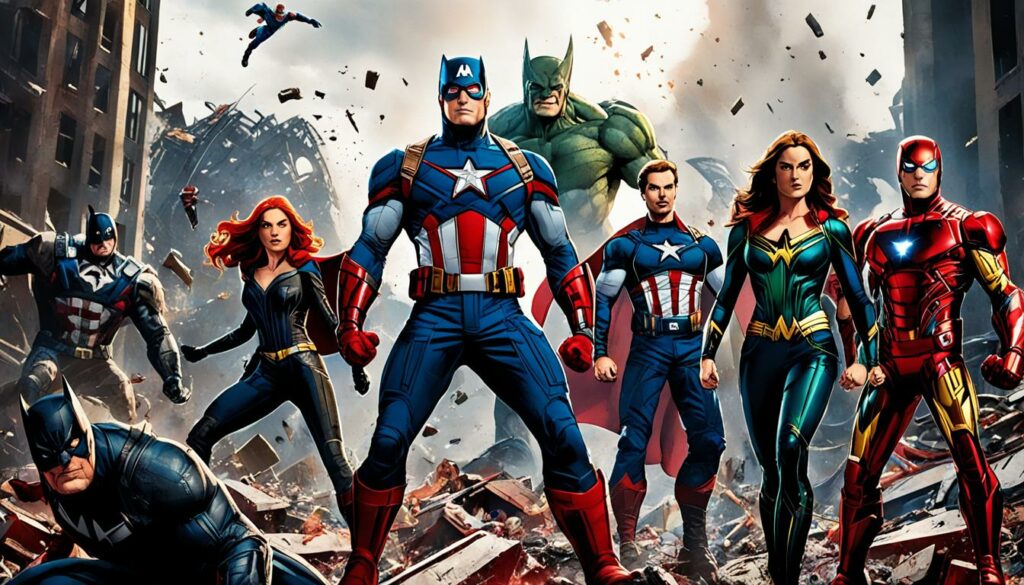
Cinematic Universes: DC Extended Universe vs Marvel Cinematic Universe
The rivalry between DC and Marvel has extended to the big screen with the creation of cinematic universes. The DC Extended Universe (DCEU) kicked off with films like “Man of Steel” and “Wonder Woman,” showcasing a darker and more serious tone. The Marvel Cinematic Universe (MCU), on the other hand, started with “Iron Man” and has become a cultural phenomenon, weaving together interconnected stories and characters across multiple films. The MCU’s blend of action, humor, and character-driven narratives has resonated with audiences, making it a dominant force in the cinematic landscape.
The DCEU and the MCU have taken different approaches to their respective cinematic universes. While the DCEU has focused on standalone films that are loosely connected, the MCU has crafted a meticulously planned and intricately interwoven tapestry of storytelling. The DCEU has had its fair share of successes with films like “Wonder Woman” and “Aquaman,” but it has also faced criticism for its inconsistent tone and overly dark aesthetic. On the other hand, the MCU has consistently delivered critically acclaimed and commercially successful films that have solidified its place as a cultural phenomenon.
One of the key factors that sets the MCU apart from the DCEU is its long-term planning and attention to detail. Marvel Studios, under the leadership of Kevin Feige, has carefully mapped out the overarching storylines and character arcs that span multiple films, creating a sense of anticipation and excitement among fans. This strategic approach has allowed the MCU to introduce new characters, expand its universe, and maintain a cohesive narrative that keeps audiences engaged.
The DCEU, on the other hand, has faced challenges in finding its footing and maintaining a consistent vision. While films like “Wonder Woman” and “Shazam!” have been well-received, others like “Justice League” and “Suicide Squad” have been criticized for their uneven storytelling and lack of cohesion. Despite these setbacks, the DCEU has shown promise with recent releases like “Birds of Prey” and “Aquaman,” suggesting that it is finding its own unique identity and direction.
It’s worth noting that both cinematic universes have their strengths and weaknesses. The DCEU has the advantage of iconic characters such as Superman, Batman, and Wonder Woman, who have captured the imagination of audiences for decades. However, the MCU’s ability to seamlessly integrate its characters and storylines has led to a cultural phenomenon that goes beyond individual films.
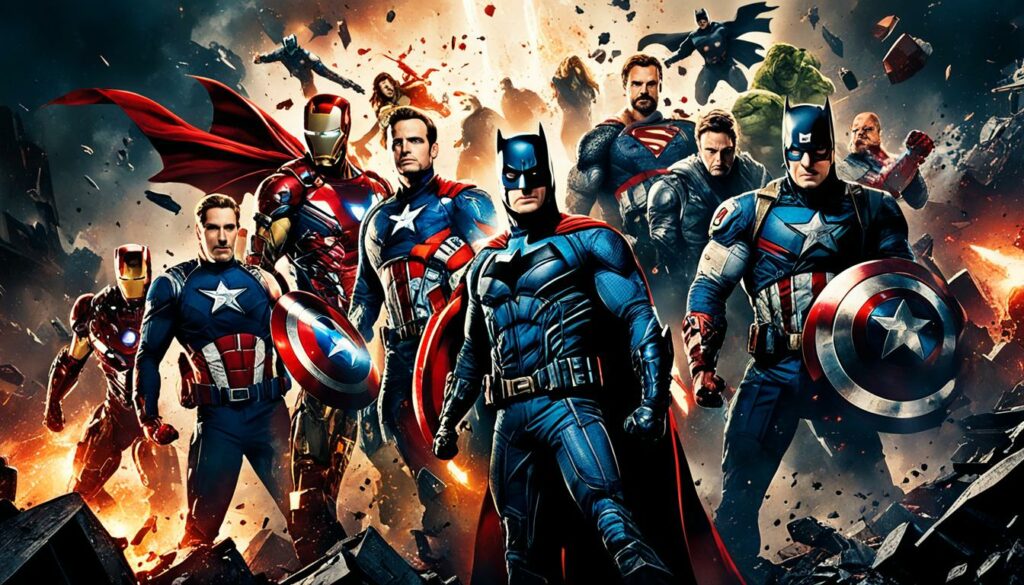
| DC Extended Universe (DCEU) | Marvel Cinematic Universe (MCU) |
|---|---|
| Started with “Man of Steel” and “Wonder Woman” | Started with “Iron Man” |
| Emphasizes a darker and more serious tone | Blends action, humor, and character-driven narratives |
| Loosely connected standalone films | Interconnected stories and characters across multiple films |
| Has faced criticism for inconsistent tone and dark aesthetic | Consistently delivers critically acclaimed and commercially successful films |
| Showcases iconic characters like Superman, Batman, and Wonder Woman | Creates anticipation and excitement through long-term planning and attention to detail |
Fan Loyalty and the Endless Debate
The rivalry between Marvel and DC is not just limited to the pages of their comics or the screens of their movies. It extends to the passionate fan bases that have formed around these iconic comic book publishers. Marvel vs DC fans is a debate that has persisted for decades, as supporters of each universe fiercely defend their favorite characters and storylines.
Marvel and DC fans engage in spirited debates, both online and offline, discussing everything from the strengths of their chosen heroes to the intricacies of the multiverses. These debates often result in friendly banter, as fans argue their points with creativity, wit, and an unmatched love for their chosen side. Whether it’s comparing the powers of Superman and Thor or debating the merits of the Marvel Cinematic Universe and the DC Extended Universe, fans keep the conversation alive and thriving.
The Creative Influence of Fan Loyalty
The unwavering loyalty of Marvel and DC fans contributes to a vibrant creative community. Artists, writers, and creators are inspired by the passion and energy of these fan bases, propelling them to push the boundaries of storytelling and character development.
Fan loyalty fosters creativity, as artists and writers strive to capture the essence of these beloved characters and build upon the rich mythologies of both Marvel and DC.
The endless debates between Marvel and DC fans not only ignite the imagination but also lead to fresh perspectives and innovative storylines. Creators understand the importance of fan input, actively engaging with the community to ensure their stories strike a chord with longtime enthusiasts and newcomers alike.
The Power of Storytelling
At the heart of the Marvel vs DC debate lies the power of storytelling. Both Marvel and DC have captivated audiences with their ability to craft compelling narratives, exploring themes of heroism, morality, and the complexity of human nature.
Marvel’s storytelling often delves into the flaws and vulnerabilities of its characters, showcasing their humanity and allowing readers and viewers to connect on a deeper emotional level. On the other hand, DC’s stories often highlight the larger-than-life nature of their heroes, exemplifying ideals of justice, sacrifice, and the triumph of good over evil.
The Endless Marvel vs DC Debate Continues
The rivalry between Marvel and DC fans is not likely to end anytime soon. As long as these iconic comic book publishers continue to create captivating stories and bring beloved characters to life, fans will remain loyal and engaged. The endless debate between Marvel and DC fans is a testament to the enduring power of these universes and the impact they have had on popular culture.
| Marvel | Founded in 1939 | Creates relatable and flawed superheroes | Pioneered interconnected storytelling |
|---|---|---|---|
| DC | Founded in 1934 | Introduces iconic and larger-than-life characters | Emphasizes archetypal representations of justice |
The rivalry between Marvel and DC fuels innovation and creativity, pushing both publishers to create even more engaging stories and captivating characters.
- Marvel vs DC debates inspire fan art, cosplay, and fan fiction
- The rivalry spurs friendly competition, driving both publishers to produce high-quality content
- Marvel and DC fans continue to support their favorite characters through merchandise, conventions, and online communities
Conclusion
The Marvel vs DC rivalry has been a lasting and captivating saga that continues to evolve, captivating audiences across various mediums. Both universes have a rich history, iconic characters, and distinct storytelling styles that contribute to the enduring appeal of the superhero genre.
The cinematic universes, the DC Extended Universe (DCEU) and the Marvel Cinematic Universe (MCU), have played a significant role in bringing these characters to life and sparking a new era of fandom and cultural significance. The DCEU’s darker and more serious tone has resonated with some audiences, while the MCU’s blend of action, humor, and character-driven narratives has garnered widespread acclaim.
The competition between Marvel and DC is not only a celebration of creativity and imagination, but also embodies universal themes that make superheroes a global phenomenon. From the enduring legacy of characters like Superman, Batman, and Wonder Woman to the relatability of flawed heroes like Iron Man and Spider-Man, the superhero genre has left an indelible mark on popular culture.
As both Marvel and DC continue to expand their multiverses and explore new storylines, the Marvel vs DC rivalry will undoubtedly endure for generations to come. Whether you’re a die-hard Marvel fan or a loyal DC supporter, the epic showdown between these two titans will forever captivate our imaginations and shape the superhero landscape.
FAQ
Why is Marvel considered better than DC?
Marvel is considered better than DC for several reasons, including their rich history and storytelling styles, the relatability of their flawed superheroes, the interconnectedness of their universe, and the success of the Marvel Cinematic Universe compared to the DC Extended Universe.
How does the history of DC Comics contribute to its appeal?
The history of DC Comics, dating back to the 1930s, has laid the foundation for the superhero genre and introduced iconic characters such as Superman and Batman. The creation of the Justice League further solidified DC’s commitment to a shared universe and established their characters as archetypal representations of justice and heroism.
What is unique about Marvel Comics?
Marvel Comics introduced flawed and relatable superheroes such as Spider-Man, the X-Men, and the Avengers. Their approach to storytelling focuses on the humanity of its characters and explores themes of identity, responsibility, and the consequences of power. Marvel also pioneered the concept of interconnectedness within their universe, allowing characters to frequently crossover and form alliances.
Who are the iconic characters from Marvel and DC?
DC has iconic characters such as Superman, Batman, and Wonder Woman, embodying the ideals of justice, determination, and strength. Marvel has iconic characters like Iron Man and Spider-Man, who showcase character development and relatability, resonating with audiences worldwide.
How do the DC Extended Universe and Marvel Cinematic Universe compare?
The DC Extended Universe (DCEU) and Marvel Cinematic Universe (MCU) are both cinematic universes that bring comic book characters to life. However, the MCU’s blend of action, humor, and character-driven narratives has resonated with audiences more, making it a dominant force in the cinematic landscape compared to the DCEU.
Why is fan loyalty and debate important in the Marvel vs DC rivalry?
Fans of Marvel and DC passionately defend their favorite characters, storylines, and cinematic adaptations, engaging in spirited debates. This competition not only sparks friendly banter but also encourages creativity as artists and writers strive to push the boundaries of storytelling to win over new fans.
What is the conclusion of the Marvel vs DC rivalry?
The rivalry between Marvel and DC is a celebration of creativity, imagination, and universal themes that make superheroes a global phenomenon. Both universes have a rich history, iconic characters, and distinct storytelling styles that contribute to the enduring appeal of the superhero genre.



